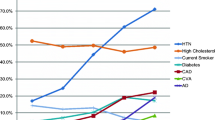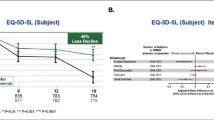Abstract
Introduction
Depression and neurocognitive function, particularly executive functioning (EF), have been associated with overall survival (OS) in patients with glioblastoma (GBM). However, the combined effect of depressive symptoms and impaired EF upon OS has not been reported.
Methods
Patients with GBM (N = 102) completed neuropsychological assessment postoperatively, including the Beck Depression Inventory-Second Edition (BDI-II) and the Trail Making Test Part B (TMTB). Median splits were used to determine cut-points denoting elevated depressive symptoms on the BDI-II and impaired EF on TMTB. Patients were stratified into four groups: low depressive symptoms/low EF impairment (− Dep/− Imp; N = 23), high depressive symptoms/low EF impairment (+ Dep/− Imp; N = 28), low depressive symptoms/high EF impairment (− Dep/+Imp; N = 28), and high depressive symptoms/high EF impairment (+ Dep/+Imp; N = 23). The Kaplan–Meier method, log-rank test, and Cox regression were used to examine differences in survival between groups.
Results
Relative to − Dep/− Imp patients (median OS = 22.8 months), median OS in all other patient groups was shorter (+ Dep/− Imp OS = 16.6; − Dep/+Imp OS = 14.8; +Dep/+Imp OS = 10.8; all p < .05). With the exception of KPS and age, groups did not differ in distribution of clinical and demographic characteristics. Neither KPS nor age modified the independent effect of BDI-II and TMTB on OS in Cox regression models.
Conclusions
The presence of depressive symptoms and impaired EF are independently associated with shorter OS in patients with GBM. These results suggest that routine neuropsychological assessment of mood and cognition may help refine prognosis and facilitate initiation of psychological and cognitive interventions, which can improve patient quality of life, and warrants further investigation.


Similar content being viewed by others
References
Acquaye AA, Vera-Bolanos E, Armstrong TS, Gilbert MR, Lin L (2013) Mood disturbance in glioma patients. J Neuro-Oncol 113:505–512
Rooney AG, Carson A, Grant R (2011) Depression in cerebral glioma patients: a systematic review of observational studies. J Natl Cancer Inst 103:61–76
Wellisch DK, Kaleita TA, Freeman D, Cloughesy T, Goldman J (2002) Predicting major depression in brain tumor patients. Psycho-Oncology 11:230–238
Mainio A, Hakko H, Niemelä A, Koivukangas J, Räsänen P (2005) Depression and functional outcome in patients with brain tumors: a population-based 1-year follow-up study. J Neurosurg 103:841–847
Litofsky NS, Farace E, Anderson F Jr, Meyers CA, Huang W, Laws ER Jr, Glioma Outcomes Project Investigators (2004) Depression in patients with high-grade glioma: results of the glioma outcomes project. Neurosurgery 54:358–367
Litofsky NS, Resnick AG (2009) The relationships between depression and brain tumors. J Neuro-Oncol 94:153
Arnold SD, Forman LM, Brigidi BD et al (2008) Evaluation and characterization of generalized anxiety and depression in patients with primary brain tumors. Neuro-Oncology 10:171–181
Pelletier G, Verhoef MJ, Khatri N, Hagen N (2002) Quality of life in brain tumor patients: the relative contributions of depression, fatigue, emotional distress, and existential issues. J Neuro-Oncol 57:41–49
Noll KR, Bradshaw ME, Weinberg JS, Wefel JS (2017) Relationships between neurocognitive functioning, mood, and quality of life in patients with temporal lobe glioma. Psycho-Oncol 26:617–624
Gathinji M, McGirt MJ, Attenello FJ et al (2009) Association of preoperative depression and survival after resection of malignant brain astrocytoma. Surg Neurol 71:299–303
Anderson SI, Taylor R, Whittle IR (1999) Mood disorders in patients after treatment for primary intracranial tumours. Br J Neurosurg 13:480–485
Spiegel D, Giese-Davis J (2003) Depression and cancer: mechanisms and disease progression. Biol Psychiatry 54:269–282
Bortolato B, Hyphantis TN, Valpione S et al (2017) Depression in cancer: the many biobehavioral pathways driving tumor progression. Cancer Treat Rev 52:58–70
Costanzo ES, Sood AK, Lutgendorf SK (2011) Biobehavioral influences on cancer progression. Immunol Allergy Clin 31:109–132
Taphoorn MJ, Klein M (2004) Cognitive deficits in adult patients with brain tumours. Lancet Neurol 3:159–168
Noll KR, Ziu M, Weinberg JS, Wefel JS (2016) Neurocognitive functioning in patients with glioma of the left and right temporal lobes. J Neuro-Oncol 128:323–331
Tucha O, Smely C, Preier M, Lange KW (2000) Cognitive deficits before treatment among patients with brain tumors. Neurosurgery 47:324–333
Noll KR, Weinberg JS, Ziu M, Benveniste RJ, Suki D, Wefel JS (2015) Neurocognitive changes associated with surgical resection of left and right temporal lobe glioma. Neurosurgery 77:777–785
Wu AS, Witgert ME, Lang FF et al (2011) Neurocognitive function before and after surgery for insular gliomas. J Neurosurg 115:1115–1125
Wefel JS, Schagen SB (2012) Chemotherapy-related cognitive dysfunction. Curr Neurol Neurosci Rep 12:267–275
Noll KR, Bradshaw ME, Weinberg JS, Wefel JS (2017) Neurocognitive functioning is associated with functional independence in newly diagnosed patients with temporal lobe glioma. Neuro-oncol Pract https://doi.org/10.1093/nop/npx028
Habets EJ, Kloet A, Walchenbach R et al (2014) Tumour and surgery effects on cognitive functioning in high-grade glioma patients. Acta Neurochir 156:1451–1459
Goldstein S, Naglieri JA (eds) (2013) Handbook of executive functioning. Springer, New York
Johnson DR, Sawyer AM, Meyers CA, O’Neill BP, Wefel JS (2012) Early measures of cognitive function predict survival in patients with newly diagnosed glioblastoma. Neuro-Oncol 14:808–816
Meyers CA, Hess KR, Yung WK, Levin VA (2000) Cognitive function as a predictor of survival in patients with recurrent malignant glioma. J Clin Oncol 18:646–650
Tombaugh TN (2004) Trail Making Test A and B: normative data stratified by age and education. Arch Clin Neuropsychol 19:203–214
Li J, Bentzen SM, Renschler M, Mehta MP (2008) Relationship between neurocognitive function and quality of life after whole-brain radiotherapy in patients with brain metastasis. Int J Radiat Oncol Biol Phys 71:64–70
Meyers CA, Hess KR (2003) Multifaceted end points in brain tumor clinical trials: cognitive deterioration precedes MRI progression. Neuro-Oncology 5:89–95
Armstrong CL, Goldstein B, Shera D, Ledakis GE, Tallent EM (2003) The predictive value of longitudinal neuropsychologic assessment in the early detection of brain tumor recurrence. Cancer 97:649–656
Noll KR, Sullaway C, Ziu M, Weinberg JS, Wefel JS (2015) Relationships between tumor grade and neurocognitive functioning in patients with glioma of the left temporal lobe prior to surgical resection. Neuro-Oncology 17:580–587
Wefel JS, Noll KR, Rao G, Cahill DP (2016) Neurocognitive function varies by IDH1 genetic mutation status in patients with malignant glioma prior to surgical resection. Neuro-Oncology 18:1656–1663
Kesler SR, Noll K, Cahill DP, Rao G, Wefel JS (2017) The effect of IDH1 mutation on the structural connectome in malignant astrocytoma. J Neuro-Oncol 131:565–574
Strauss E, Sherman EM, Spreen O (2006) A compendium of neuropsychological tests: administration, norms, and commentary, Am Chem Soc
Kortte KB, Horner MD, Windham WK (2002) The trail making test, part B: cognitive flexibility or ability to maintain set? Appl Neuropsychol Adult 9:106–109
Beck AT, Steer RA, Brown GK (1996) Beck depression inventory-second edition: manual. Pearson, San Antonio
American Psychiatric Association (2000) DSM-IV-TR: diagnostic and statistical manual of mental disorders, text revision. American Psychiatric Association, Washington, DC
Sacco R, Santangelo G, Stamenova S et al (2016) Psychometric properties and validity of beck depression inventory II in multiple sclerosis. Eur J Neurol 23:744–750
Leentjens AF, Verhey FR, Luijckx GJ, Troost J (2000) The validity of the beck depression inventory as a screening and diagnostic instrument for depression in patients with Parkinson’s disease. Mov Disord 15:1221–1224
Pichlmeier U, Bink A, Schackert G, Stummer W, ALA Glioma Study Group (2008) Resection and survival in glioblastoma multiforme: an RTOG recursive partitioning analysis of ALA study patients. Neuro-Oncology 10:1025–1034
Lerdal A, Kottorp A, Gay CL, Grov EK, Lee KA (2014) Rasch analysis of the Beck Depression Inventory-II in stroke survivors: a cross-sectional study. J Affect Disord 158:48–52
Sohlberg MM, Mateer CA (2017) Cognitive rehabilitation: an integrative neuropsychological approach. Guilford Publications, New York
Locke DE, Cerhan JH, Wu W, Malec JF, Clark MM, Rummans TA, Brown PD (2008) Cognitive rehabilitation and problem-solving to improve quality of life of patients with primary brain tumors: a pilot study. J Support Oncol 6:383–391
Gehring K, Patwardhan SY, Collins R, Groves MD, Etzel CJ, Meyers CA, Wefel JS (2012) A randomized trial on the efficacy of methylphenidate and modafinil for improving cognitive functioning and symptoms in patients with a primary brain tumor. J Neuro-Oncol 107:165–174
Meyers CA, Weitzner MA, Valentine AD, Levin VA (1998) Methylphenidate therapy improves cognition, mood, and function of brain tumor patients. J Clin Oncol 16:2522–2527
Furze G, Dumville JC, Miles JN, Irvine K, Thompson DR, Lewin RJ (2009) “Prehabilitation” prior to CABG surgery improves physical functioning and depression. Int J Cardiol 132:51–58
Culley DJ, Crosby G (2015) Prehabilitation for prevention of postoperative cognitive dysfunction? Anesthesiology 123:7–9
Butler AC, Chapman JE, Forman EM, Beck AT (2006) The empirical status of cognitive-behavioral therapy: a review of meta-analyses. Clin Psychol Rev 26:17–31
Fournier JC, DeRubeis RJ, Hollon SD, Dimidjian S, Amsterdam JD, Shelton RC, Fawcett J (2010) Antidepressant drug effects and depression severity: a patient-level meta-analysis. JAMA 303:47–53
Ostrom QT, Gittleman H, Xu J, Kromer C, Wolinsky Y, Kruchko C, Barnholtz-Sloan JS (2016) CBTRUS statistical report: primary brain and other central nervous system tumors diagnosed in the United States in 2009–2013. Neuro-Oncology 18(suppl 5):v1–75
Acknowledgements
This work was previously presented as a rapid report at the 19th Annual Scientific Meeting and Education Day of the Society for Neuro-Oncology, Miami Beach, Florida, November 16, 2014.
Funding
Research reported in this publication was supported by the National Institutes of Health through the National Institute of Nursing Research award number R01NR014195 (J.S.W.). The content is solely the responsibility of the authors and does not necessarily represent the official views of the National Institutes of Health.
Author information
Authors and Affiliations
Contributions
Kyle R. Noll contributed to experimental design, data analysis and interpretation, and manuscript drafting and editing. Jeffrey S. Wefel contributed to experimental design, data analysis and interpretation, and manuscript drafting and editing. Catherine M. Sullaway contributed to data interpretation and manuscript drafting and editing.
Corresponding author
Ethics declarations
Conflict of interest
The authors report no conflicts of interest.
Rights and permissions
About this article
Cite this article
Noll, K.R., Sullaway, C.M. & Wefel, J.S. Depressive symptoms and executive function in relation to survival in patients with glioblastoma. J Neurooncol 142, 183–191 (2019). https://doi.org/10.1007/s11060-018-03081-z
Received:
Accepted:
Published:
Issue Date:
DOI: https://doi.org/10.1007/s11060-018-03081-z




